Coordinación
Una coordinación sólida puede evitar vacíos y duplicaciones en las respuestas humanitarias, así como garantizar que los PTM complementen otros tipos de asistencia. Sin embargo, el informe del «Estado Global de los Programas de Transferencias Monetarias» de la CALP Network muestra que la coordinación de la asistencia en efectivo es vista como débil y ad hoc, y que esto está teniendo graves repercusiones operativas.
Los donantes, las ONG y los líderes de los grupos de trabajo de transferencias monetarias (GTM) han pedido claridad sobre tres temas principales relacionados con la coordinación de la asistencia en efectivo:
- Quién debe ser responsable de asegurar una coordinación eficaz de la asistencia en efectivo;
- Cuál es la función y el mandato de los grupos de trabajo de transferencias monetarias, incluso en relación con las transferencias monetarias multipropósito;
- Cómo se debe dotar de recursos a la coordinación de asistencia en efectivo.
Tenemos que basarnos urgentemente en lo que funciona y proporcionar claridad a nivel mundial sobre las preguntas arriba mencionadas, adaptándonos a los diferentes contextos. Hace mucho tiempo que se deberían haber tomado decisiones claras basadas en necesidades operativas y no en la política de las agencias.
Prioridades actuales
El objetivo de la CALP Network es contribuir a seguir progresando en este tema en tres niveles: apoyar a los grupos de trabajo de transferencias monetarias a nivel regional; contribuir a soluciones prácticas para la coordinación de la asistencia en efectivo a nivel mundial; y convocar una discusión basada en la evidencia sobre temas clave, destacando puntos de decisión críticos y oportunidades de progreso.
Contenido destacado

Cash Coordination Tip Sheet
Guidelines and Tools
This tip sheet sets out established best practice, key guidance and resources for all aspects of cash coordination, intended as a clear, accessible and action-oriented guide for those engaged in coordination of cash and voucher assistance (CVA) at the field level.

Introducing the Cash Coordination Tip Sheet
Webinar
The CALP Network has developed a tipsheet setting out established best practice and key guidance and resources for all aspects of cash coordination, intended as a clear, accessible and action-oriented guide for those engaged in coordination of cash and voucher assistance at the field level.

Cash Coordination: A proposal from members in MENA
Blog Post
Earlier this year the CALP Network undertook regional consultations to explore options for cash coordination. This blog lays out recommendations from participants from the Middle East and North Africa who sketched out what cash coordination, and coordination more broadly, could look like in future to support a more effective, efficient and accountable response.
Últimos recursos
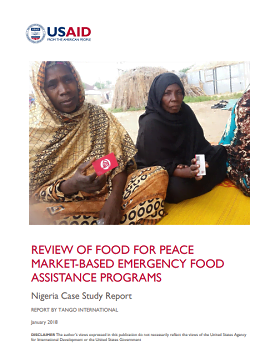
Review of Food for Peace Market-Based Emergency Food Assistance Programs: Nigeria Case Study Report
Case Study
Nigeria is an example of food assistance in a conflict situation in the Sahelian context. The response used information technology to deliver one of the more sophisticated applications of voucher programs. This case is a good example of proactive implementing partner (IP) mechanisms and monitoring systems...

Child Outcomes of Cash Transfer Programming: Appendix 2
Report
This is an appendix to the document “Research brief: Child outcomes of cash transfer programming. A synthesis of the evidence around survival, education and protection in humanitarian and non-humanitarian contexts”. This appendix contains a summary of the available evidence per each outcome of...

Breve Informe de la Evaluación: Experiencia y aprendizaje de las pruebas piloto de buenas prácticas en el análisis de mercado para respuestas humanitarias
Guía y herramientas
A través del proyecto Improving the Uptake of Humanitarian Market Analysis (Mejoramiento de la aceptación del análisis de mercado para respuestas humanitarias), el IRC tuvo como objetivo ayudar a facilitar el uso sistemático de la información del mercado para la programación de la respuesta...
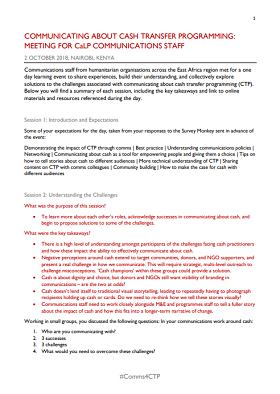
Communicating about Cash Transfer Programming: Meeting for the CALP Network Communications staff
Report
On Tuesday 2 October 2018, the CALP Network convened communications staff from member agencies and beyond across the East Africa region, for a one day learning event in Nairobi. In the first of its kind, this event aimed to bring together communications experts to understand how, collectively, we can work...
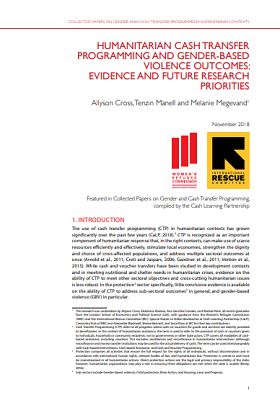
Humanitarian Cash Transfer Programming and Gender-based Violence Outcomes: Evidence and Future Research Priorities
Report
From ‘Collected Papers on Gender and Cash Transfer Programmes in Humanitarian Contexts’. Existing gender inequalities mean that disasters and conflicts impact women, men, girls and boys differently. Cash based assistance is one of the most significant developments in humanitarian assistance in recent...

Review of Food for Peace Market-Based Emergency Food Assistance Programs: Sierra Leone Case Study Report
Report
Sierra Leone represents a remarkable experiment in market-based emergency programming using unconditional cash transfers and some conditional cash transfers Sierra Leone reflects the challenges of providing food assistance in the wake of a major infectious disease epidemic. Food insecurity increased due...
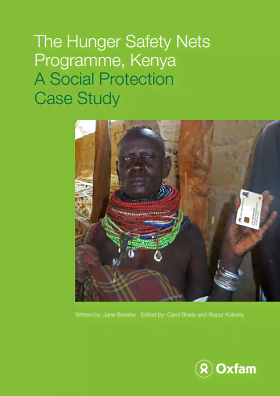
The Hunger Safety Nets Programme, Kenya – A Social Protection Case Study
Report
The Hunger Safety Nets Programme (HSNP) began in 2008 in the four poorest districts of northern Kenya (Turkana, Marsabit, Mandera and Wajir). The programme was designed to give long term support
through regular cash transfers, to those households most vulnerable to food insecurity.
The safety net...

Child Outcomes of Cash Transfer Programming: Appendix 1
Report
This is an appendix to the document “Research brief: Child outcomes of cash transfer programming. A synthesis of the evidence around survival, education and protection in humanitarian and non-humanitarian contexts”. This appendix contains the list of studies that were reviewed, with information on...

Multi-Purpose Cash and Sectoral Outcomes: a Review of Evidence and Learning
Report
Growing attention to multi-purpose cash offers an exciting opportunity to redress a long-standing shortcoming of humanitarian response. There is a need to better understand and respond to crisis-affected people in a more holistic and coherent way, going beyond sectors to bring the emphasis back to how...
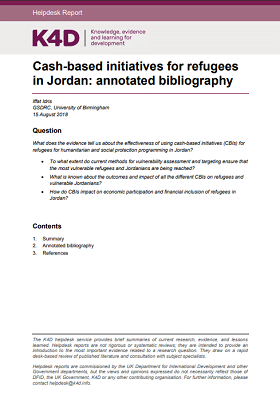
Cash-Based Initiatives for Refugees in Jordan: Annotated Bibliography
Report
The available literature tells us little about the effectiveness of targeting of cash-based initiatives (CBIs) for refugees in Jordan. However, it suggests there are positive impacts on food security for refugees, their ability to pay for rent and utilities and their psycho-social well-being, as well as...
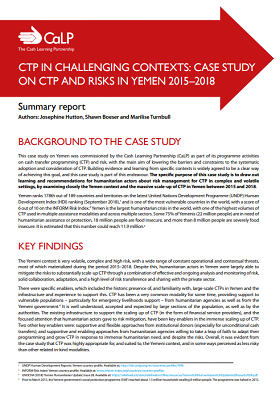
CTP in Challenging Contexts: Case Study on CTP and Risks in Yemen 2015–2018 – Summary
Report
Yemen is one of the most vulnerable countries in the world, and has long suffered from poverty, instability and vulnerability. The conflict, which has unravelled since late 2014, and, more specifically, since March 2015, has left 22 million Yemenis in need of some kind of humanitarian assistance or...

“Breaking Barriers to Girls’ Education by Breaking Cycles of Poverty” Cash Transfers in South Sudan: A Case Study
Case Study
From ‘Collected Papers on Gender and Cash Transfer Programmes in Humanitarian Contexts’. Existing gender inequalities mean that disasters and conflicts impact women, men, girls and boys differently. Cash based assistance is one of the most significant developments in humanitarian assistance in recent...

Review of Food for Peace Market-Based Emergency Food Assistance Programs: Zimbabwe Case Study Report
Report
Zimbabwe reflects the recent Southern African drought crisis during a period of a regional El Niño-related drought and a national cash crisis. The United States Agency for International Development (USAID) Office of Food for Peace (FFP) funded a mix of programming between fiscal years 2011 and 2015,...

Learning Review: Blockchain Open Loop Cash Transfer Pilot Project
Report
A pilot study of the use of blockchain open loop in cash transfers. The study explores how mobile money through MPESA can be linked to blockchain embracing innovation and improve accountability in Kenya.

Somalia Donor Working Group (DWG) – Safety Net Terms of Reference (ToR)
Guidelines and Tools
Large scale cash and voucher transfers have formed the basis of the humanitarian response to the 2016-18 drought (and threat of famine) in Somalia and successfully so. While sporadic small scale cash transfer projects in the past lacked coordination and coherence, this time a great deal of effort has been...

Hygiene NFI Provision through Cash Assistance with E-Voucher Modality: PDM
Report
NCA & LWF Gure-shembola Refugee Camp CBI PDM report.
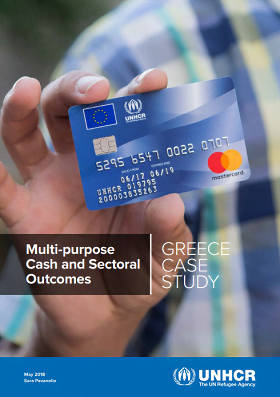
Multi-purpose Cash and Sectoral Outcomes – Greece case study
Report
Starting in 2015, the European Commission has been providing funding to support the humanitarian response in Greece through the Emergency Support to Integration & Accommodation’ (ESTIA) programme managed by its European Union Civil Protection and Humanitarian Aid (ECHO). ESTIA is implemented by UNHCR...

Tracking Cash & Voucher Programming Workshop
Presentation
The Tracking Cash & Voucher Workshop, convened by the CALP Network and DG ECHO, was held on June 6th 2018. The main objectives of the workshop, as defined by the co-leads, were as follows: Provide a forum to identify best practices and understand mutual objectives regarding measuring Cash and Voucher...

CTP in Challenging Contexts: Case Study on CTP and Risks in Yemen 2015–2018
Report
Yemen is one of the most vulnerable countries in the world, and has long suffered from poverty, instability and vulnerability. The conflict, which has unravelled since late 2014, and, more specifically, since March 2015, has left 22 million Yemenis in need of some kind of humanitarian assistance or...

Addressing food insecurity: Does the choice of transfer modality matter?
Report
This operational study analyses the impact of multipurpose cash (MPC)—associated with a nutrition-sensitive training—on the food security and nutrition of the households affected by the drought in the Salvadoran Dry Corridor. Three quantitative and qualitative surveys—with a strong gender...